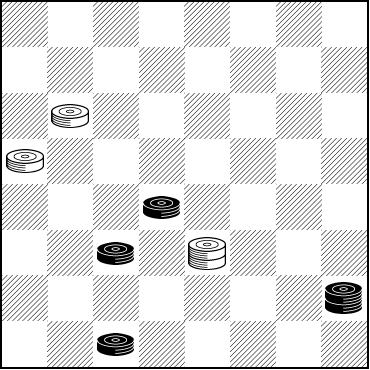The Checker Maven
Jump to navigationBlither's Advice

There are people who talk a lot, and despite our illustration above, we don't at all mean to stereotype this behavior. Copious yakking knows no boundaries of gender, group, or anything else.
At times, wordiness can be most beneficial. For instance, our monthly Checker School columns usually contain rather verbose advice and explanation, and we think that's a good thing, as it makes the lessons easier to learn and apply. But this month, Ben Boland, the original source of our current pedagogical series, is untypically laconic. Is it because the material is easier than usual? Or was Mr. Boland having an especially quiet day? We can't know the answer, but we can have a look at the subject study, which traces back to a certain L. J. Vair.
WHITE

BLACK
Black to Play and Win
B:W24,20,K10:B15,11,K5,3.
You might say that the position speaks for itself; Black is a man up and ought to be able to win. Yet, it's trickier than you might think at first glance. Can you get the last word on this problem or will it leave you speechless? We're only going to say that clicking on Read More will bring you to the solution, a sample game, and explanatory notes.![]()
Solution
The solution and lettered notes are from Ben Boland's Famous Positions in the Game of Checkers. Numbered notes are from computer analysis with the KingsRow engine, and are much more extensive than usual as there were many interesting aspects to this study.
15-18, 24-19---1, 5-1---2, 19-16, 3-7, 10-3, 1-6, 16-7, 6-2. Black Wins---3.
Game: 11-15, 23-19, 9-14, 22-17, 6-9, 17-13, 2-6, 25-22, 8-11, 29-25, 4-8, 24-20, 15-24, 28-19, 11-15, 27-24, 14-17, 21-14, 9-18, 26-23, 18-27, 32-23, 10-14, 19-10, 6-15, 13-9 14-17, 22-13, 5-14, 25-22, 1-6, 31-26, 14-17---4, 30-25. 8-11, 23-19---5, 7-10---6, 25-21, 11-16---7, 21-7---A, 8, 16-30, 7-2, 30-26, 2-9, 26-17, 9-6, 17-14, 13-9---B, 9, 14-5, 6-10. Forms above position. L. J. Vair, Game No. 199, The North American Checker Board, April 1, 1899, Vol. 6.
A---I consider this move a loser. Vair.
B---To correct Mr. McCallum who leaves it here as drawn in Game No. 192, N. A. C. Board.
1---Of course 10-15 loses at once after 18-22 15-8 3-12 Black Wins.
2---White's last move set a small trap, and this seems to be the point of the study; for if Black now advances 18-22 then 19-16 costs him the man on 11 and the game is drawn. The text move deals with this issue in an ingenious manner.
3---Whatever White does, Black gets two men and wins easily. A very clever win.
4---Interesting here is the alternative 14-18 23-14 15-18 22-15 7-10 14-7 3-28 to a draw. Shades of Willie Ryan!
5---If 25-21 then 6-10.
6---The alternative 17-21 also draws: 17-21 19-1 26-30 26-23 30-26 24-19 26-17 to a draw.
7---This unfortunate move actually loses for Black, and Mr. Vair didn't make note of it. 12-16 is necessary to draw: 12-16 19-12 10-14 forces White to give back the extra man, only to win it back and then lose it again! The computer continuation is 26-23 17-26 23-19 15-18 19-15 26-31 15-8 18-23 24-19 23-27 8-4 31-26 4-8 26-22 8-11 22-18 19-15 27-31 and Black finally pulls even and gets the draw after 15-10 6-15.
8---Mr. Vair is correct. Instead 20-11 wins for White as Black has not a single move that doesn't lose material.
9---White might try instead 6-2 here, but will still lose because of the weak man on 24, for instance : 6-2 3-8 2-6 15-18 24-19 18-23 6-2 14-10 13-9 23-27 9-5 8-11 5-1 27-31 2-6 10-14 6-2 31-27 1-6 27-24 Black wins.
The above position may be found as No. 164, in the North American Checker Board, March 1, 1899. It may also be found in "Familiar Themes," Page 44, No. 27, where the Theme "Captive Cossacks," is illustrated.
And now, here's the "advice" that we at The Checker Maven heartily recommend that you read, enjoy, and ignore.
In a team match use every stratagem. Take your seat with a confident swagger. Look your man over slowly and keenly. He will think you know all that's worth knowing. That style of bounce is better than blowing.
If he moves fast, be sure you move slowly. If slowly, dash off your first 10 moves sharply—for that may rattle him the whole evening. If he protests at your old pipe smoking, beg his pardon, but smoke like a volcano.
He'll soon become sick, dizzy and reckless, and hasten to get out of purgatory by losing his games to get rid of you. If he wants to call the first ending a draw, shake your head wisely; declare you can win by the "crocodile position."
Ten to one he'll wonder "what that infernal thing is," get nervous, bewildered and lose the draw. If ever you are over-matched, try to make one game last the whole evening.
Under-rate no man! A collier oft plays with more strategy than a prime minister. Beware of the cobbler, he generally knows more tricks than a political leader.
Above all try to keep your head cool, for reckless haste oft loses the game and the match.—James Hill.
You can email the Webmaster with comments on this article.
